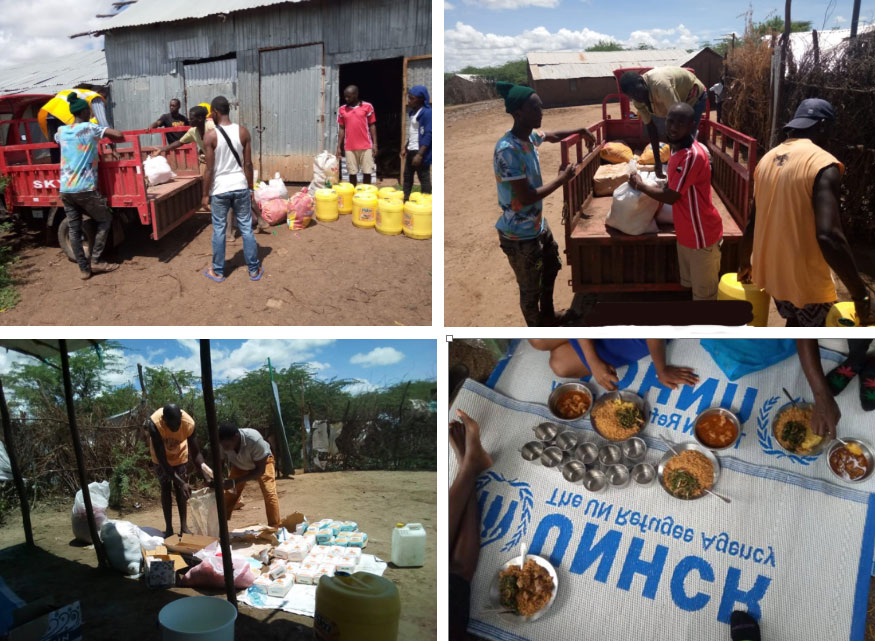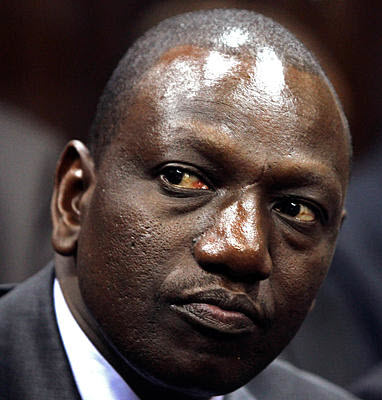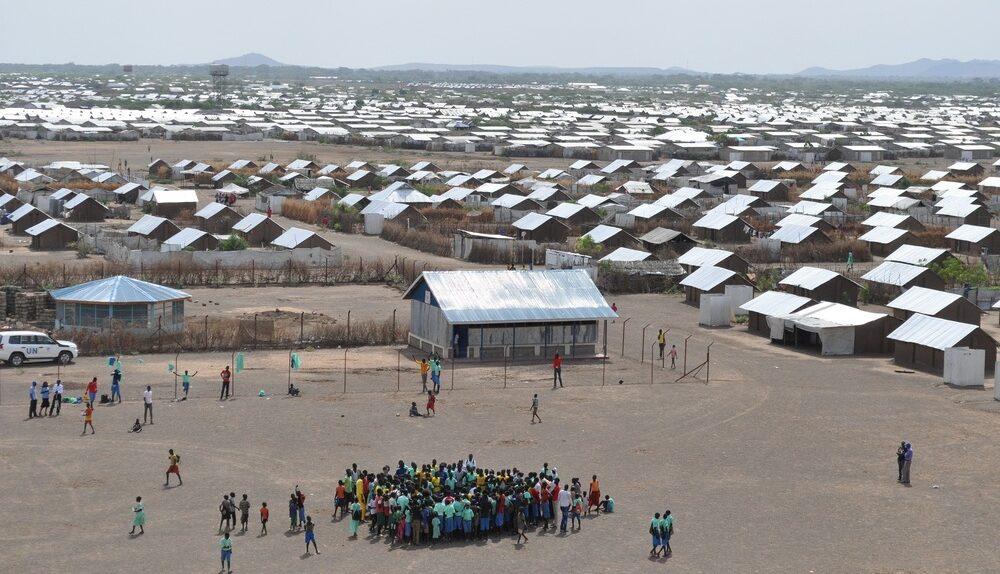Kenya no longer safe for Ugandan LGBTQI+ refugees
Joto La Jiwe is a Ugandan correspondent for the African…
Kenyan authorities turning hostile as they form alliances with anti-LGBT groups

The future of Ugandan LGBTQI+ asylum seekers living in Kenya seems to be in limbo following growing reports of homophobic attacks and anti-rights events.
For a long time, Kenya has been regarded as a sanctuary for LGBTQI+ persons escaping discrimination in the Great Lakes and Horn of Africa Regions. The U.N. said about 1,000 Ugandans sheltered there in 2021, a figure that the Refugee Coalition of East Africa says has since grown to about 4,000 following the enactment of the Anti-Homosexuality Act (AHA) 2023, which prescribes the death penalty for “aggravated homosexuality.”
To Ugandan LGBTQI+ people, Kenya has been the top place of refuge because of its proximity and relatively accommodative environment. Kenya has statutes criminalizing same-sex relations, but they are rarely enforced.
Like in Uganda, the situation in Kenya is said to have deteriorated in September 2023 when the Kenyan Supreme Court ruled that the National Gay & Lesbian Human Rights Commission (NGLHRC) should be allowed to officially register as a non-governmental organisation (NGO), saying it was unconstitutional to deny approval on the basis of applicants’ sexual orientation.
“Just like everyone else, [LGBTQ+ people] have a right to freedom of association, which includes the right to form an association of any kind,” the court stated.
Rather than make life easier for the LGBTQ+ community, the LGBTQI+ community says the ruling instead galvanized many Kenyans against them and exposed them to danger.
It was made worse by the authorities that teamed up with anti-rights groups to not only criticize the decision but also embarked on an anti-gay crusade online and in the real world.

“We respect the Supreme Court’s decision but that doesn’t mean we have to agree with it. Our values, customs and Christianity do not allow us to support same-sex marriages,” said Kenyan President William Ruto after the court’s ruling in March.
His deputy Rigathi Gachagua said the court decision was “Satanic and repugnant to morality and way of justice.”
The country’s attorney general said the government would be seeking a review of the ruling as allowed under Kenyan law.
Human rights groups had to cut short their celebrations of the court victory and embark on dealing with these early warnings of inciting and homophobic talk from the country’s most powerful people.
Soon, reports started to emerge of incidents of malicious online and offline behaviour and public demonstrations against sexual minorities.
Days after the country’s leaders criticized the court ruling, Kim Kads (not her real name), a 26-year-old transgender woman and a small group of Kenyan friends were attacked as they left a club in Rongai, on the outskirts of Nairobi.
“They attacked me claiming that I was dressed like a lady yet I’m a man,” Kim told the press. “They smashed my phone and told me to relocate from the town.”
In parts of Nairobi and elsewhere in Kenya, activists say evictions of queer tenants by landlords has become a common occurrence.
Lucky for Kim, her landlord knew her gender identity, and when the hate campaigns got heated, he was kind enough to help her and 11 other Ugandans to get a safer place to stay. They now live in a shelter run by a local pro-LGBTQ+ group.
Most Ugandans are in Kenya not because it is their target destination but as part of their transit to refugee-welcoming European countries or Canada.
They claim that much as Kenya offers a safe haven for them, the growing anti-rights activities in the country do not leave them with much choice but to seek for resettlement in a third country, preferably in Europe, through the UNHCR offices in Nairobi.
Davids fled Uganda in 2023 after his home and maize farm was burnt down by village vigilantes. It was a narrow escape for him. He says that he heard them before they could get to his house and ran into the bush from where he hatched a plan to leave Uganda.

He ended up in Kenya’s Kakuma refugee camp. His asylum application is still pending.
As Kenya legislators prepare a so-called Protection of the Family Bill, an anti-LGBTQ bill similar to Uganda’s Anti-Homosexuality Act, queer refugees are now desperate to leave Kenya before the situation gets worse. The bill obligates the Kenyan government to deny asylum or expel LGBTI refugees based on their sexuality or sexual orientation.
There are reports that at least 200 LGBTQ asylum seekers left for South Sudan after learning that it was offering rapid clearance of asylum claims and resettlement to Western countries.
Some are reported to have paid $1,000 to smugglers to get to South Sudan.
“I wanted to go to Europe to restart my life but that was not to be. There seems to be no light at the end of the tunnel,” a refugee named Jeremy told the AFP news network after a failed attempt to seek asylum through South Sudan.
In 2021, the management of asylum cases passed from the UN to the Kenyan government.
The government’s Department of Refugee Services is now responsible for registering applications and determining refugee status in Kenya, and according to the refugee commissioner for Kenya, John Burugu, priorities have changed. Asylum seekers will now have to meet the legal definition set by Kenya’s 2021 Refugees Act before being granted refugee status. Persecution for sexuality or gender will no longer be grounds for asylum.
The law only says people facing persecution for their “membership in a social group” will be considered.
Although the average time to process an asylum application in Kenya is about 12 months, some LGBTQ+ applicants say their applications have taken years. Without refugee status, they cannot rent apartments, work or open bank accounts.
The Kenyan authorities however claim that they have this sorted under the Shirika (Integration) Plan, recently launched by President Ruto to transform two of the world’s largest refugee camps, Kakuma and Dadaab, into open cities. They say that will allow the country’s more than 800,000 refugees to finally get jobs, health care and other services. They will be free to choose to leave the settlements to live alongside other Kenyans.
The $943 million plan will be implemented through 2036 with funding from the World Bank, UNHCR, private institutions, and the Kenyan government.
“The idea of integration is good, because it will guarantee refugees a free life and all rights, like any other Kenyan,” says one gay rights advocate who preferred not to be named. He runs a shelter for Ugandan LGBTQ refugees in Kenya.
He is however concerned that given the general anti-rights atmosphere in Kenya, the Shirika plan could be taking LGBTQI+ refugees from the frying pan into fire if the government does not take serious precautions.
“Unlike other refugees, we have serious concerns about security, health and housing that should be incorporated, but how will we voice these issues when we are not part of the process?” he said, adding that if discrimination is happening in controlled and secured camps, there is a high possibility that things will get worse in open communities.
According to a 2023 joint report by the Kenya National Gay and Lesbian Human Rights Commission (NGLHRC) and Amnesty International, LGBTQI individuals in Kakuma camp have suffered physical and sexual violence and other serious human rights abuses, including violations of their right to be free from torture and ill-treatment, because of their sexual orientation, gender identity and/or expression, or sexual characteristics.
The report, based on interviews with 41 LGBTI asylum seekers and refugees between 2018 and February 2023, details how perpetrators of violence and intimidation towards LGBTI individuals commit their crimes with almost total impunity, enabled by inaction on the part of the authorities.
During the recent the Pan-African Conference on Family Values meeting in Nairobi, which brought together anti-rights groups and individuals from across the globe, the Kenyan National Assembly Speaker Moses Wetang’ula refereed to same-sex relationships as outlawed.
For Uganda LGBTQI+ persons taking refuge in Kenya, the future appears bleak. They cannot return to Uganda if they are looking for safet, and a budding alliance between Kenyan leaders and anti-rights groups suggest that their days of safety are numbered.
The ball is now in the hands third countries and donors to not only open their doors but also increase funding for resettlement and establish or enhance flexible alternative pathways for LGBTI asylum seekers in Kenya.





The flight of refugees from Kenya is not recent news. Refugees unfortunately make hasty decisions without full and proper consultation and can be misled by the fraudulent straight opportunists and smugglers among them. Many fled to South Sudan, even though AHRC (African Human Rights Coalition) issued an advisory against it when the mass exodus from Kenya occurred some years back. Now some are trying to raise funds to return to Kenya due to the hostile environment in South Sudan, without any clarity as to implications. The situation is highly complex. Refugees are advised to seek individual advice rather than simply follow others. Each case and circumstance is unique, though commonality may apply. Reporters are advised to be cautious when reporting because the Governments in some criminalizing countries do not want to be seen to be helping LGBT especially during elections years.
It is a very dangerous decision – to travel through borders – where we are seeing many arrests and detentions, all across the continent.
At AHRC we issue caution in advising people as to which country to flee to – the situation in Africa has become even more complex in recent months.
Innovative pathways are sought. The current fragile ramework for LGBT Africans is teetering on collapse. Please be aware the frauds out there have made it worse.